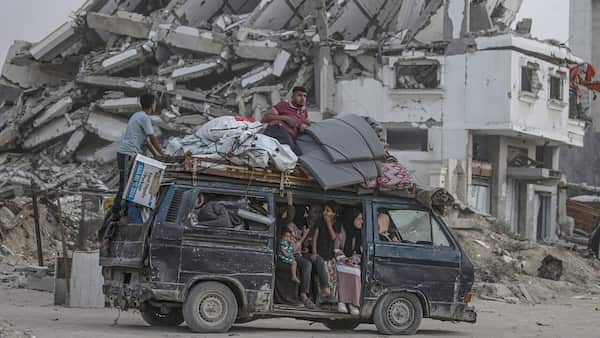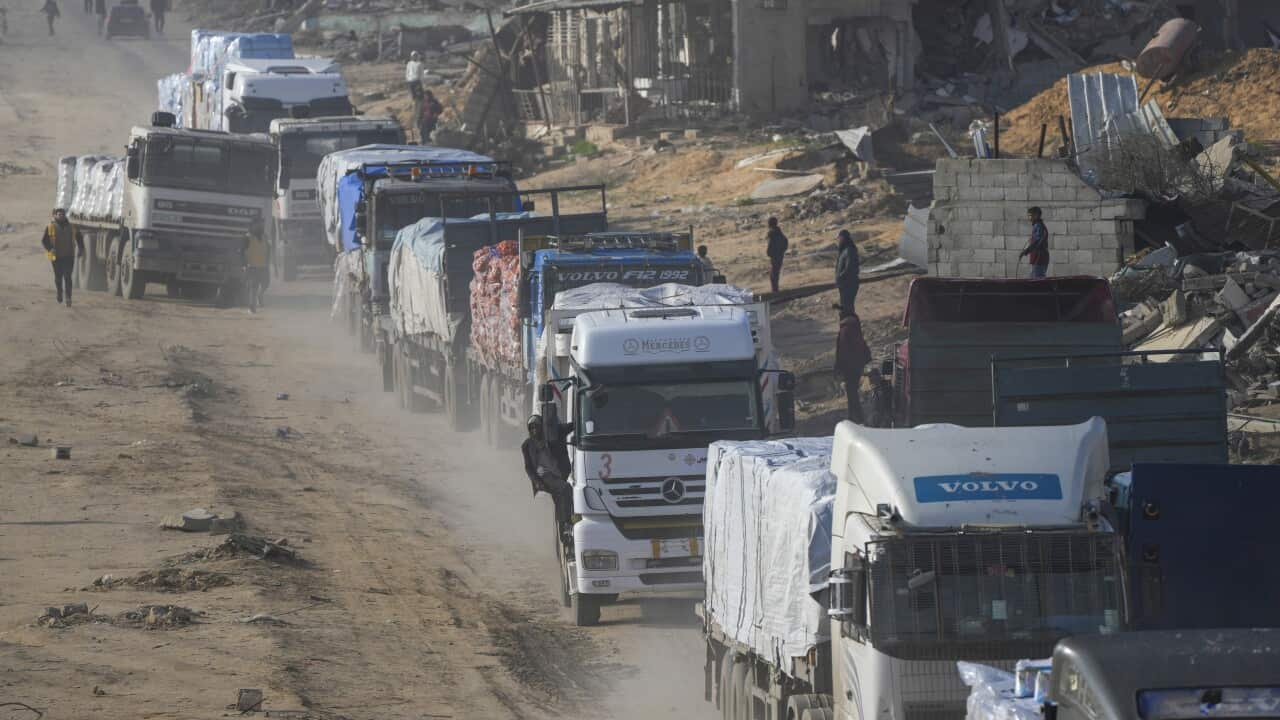Key Points
- No aid has yet reached civilians in Gaza despite Israel allowing a handful of deliveries after an 11-week blockade.
- The UN aid chief has warned 14,000 babies are at risk of dying within 48 hours without urgent aid.
- The UN was later asked about this number – and said there were babies in need of care.
No aid has yet been distributed in the Gaza Strip, the United Nations said a day after Israel allowed limited humanitarian deliveries to resume after an 11-week blockade on the Palestinian enclave, where experts warn famine now looms.
UN spokesperson Stephane Dujarric said four trucks of baby food were dropped off on the Palestinian side of the border on Tuesday AEST, and that a few dozen trucks of flour, medicine, nutrition supplies and other basic items have also entered Gaza.
“Israeli authorities are requiring us to offload supplies on the Palestinian side of Kerem Shalom crossing and reload them separately once they secure our team’s access from inside the Gaza Strip,” Dujarric told reporters.
“Today, one of our teams waited several hours for the Israeli green light to access the Kerem Shalom area and collect the nutrition supplies. Unfortunately, they were not able to bring those supplies into our warehouse.”
Earlier on Tuesday, a spokesperson for the UN humanitarian office in Geneva said Israel had given permission for about 100 aid trucks to enter Gaza.
UN aid chief Tom Fletcher said the initial amount of aid approved by Israel was “a drop in the ocean”.
“There are 14,000 babies that will die in the next 48 hours unless we can reach them,” he told the BBC.
The number appears to reflect a report from the Integrated Food Security Phase Classification (IPC) which stated 14,100 severe cases of acute malnutrition could occur in children between April 2025 and March 2026.
Israel has said its blockade is aimed in part at preventing Palestinian militants from diverting and seizing aid supplies. Hamas has denied doing so.
Earlier this week, Israel started an expanded ground assault on Gaza, aimed at destroying Hamas and seizing the entirety of Gaza, which has been devastated by an Israeli air and ground war since Hamas’ cross-border attack on Israel in October 2023.
How has the international community responded?
Australia has joined 22 international counterparts to demand Israel allow the full resumption of aid in Gaza to avoid widespread starvation.
United Kingdom Prime Minister Keir Starmer told parliament he, along with the leaders of France and Canada, were “horrified” by Israel’s military escalation, repeating calls for a ceasefire.
Earlier this week, the three nations had warned of “concrete actions” against Israel if it did not stop military operations in Gaza and lift restrictions on aid.
A day later, UK foreign minister David Lammy announced the suspension of negotiations over a new free trade deal with Israel, saying Israel’s cabinet ministers’ calls to “purify Gaza” by expelling Palestinians were repellent, monstrous and extremist.
In addition to suspending trade talks, the UK government also summoned Israel’s ambassador and announced sanctions against a number of persons and groups in the Israeli-occupied West Bank over alleged violence against Palestinian residents.
A United States-backed group plans to start work in the Gaza Strip by the end of May, overseeing a new model of aid distribution in the Palestinian enclave. But the UN says the plan is not impartial or neutral, and it will not be involved.
Malnutrition rates in the densely populated territory have risen during the Israeli blockade and could worsen if food shortages continue, a health official at the UN Palestinian refugee agency UNRWA said in Geneva.
Akihiro Seita, UNRWA director of health, said: “I have data until [the] end of April and it shows malnutrition on the rise.”
“And then the worry is that if the current food shortage continues, it will exponentially increase, and then get beyond our control.”

